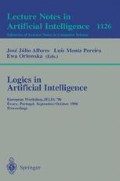Abstract
We present a semantic tableaux calculus for propositional nonmonotonic modal logics, based on possible-worlds characterisations for nonmonotonic modal logics. This method is parametric with respect to both the modal logic and the preference semantics, since it handles in a uniform way the entailment problem for a wide class of nonmonotonic modal logics: McDermott and Doyle's logics and ground logics. It also achieves the computational complexity lower bounds.
Preview
Unable to display preview. Download preview PDF.
References
G. Amati, L. Carlucci Aiello, D. Gabbay, and F. Pirri. A proof theoretical approach to default reasoning I: Tableaux for default logic. J. of Logic and Computation, 1995.
F. Baader and B. Hollunder. Embedding defaults into terminological knowledge representation formalisms. JAR, 14:149–180, 1995.
L. Catach. TABLEAUX, a general theorem prover for modal logics. JAR, 7:489–510, 1991.
F. M. Donini, M. Lenzerini, D. Nardi, W. Nutt, and A. Schaerf. Adding epistemic operators to concept languages. In Proc. of KR-92, pages 342–353. 1992.
F. M. Donini, D. Nardi, and R. Rosati. Ground nonmonotonic modal logics for knowledge representation. In Proc. of WOCFAI-95, pages 133–144. Angkor, 1995.
M. Fitting. Proof Methods for Modal and Intuitionistic Logics. Reidel, 1983.
R. Goré. Semi-analytic tableaux for modal logics with application to nonmonotonicity. Logique et Analyse, 133–134, 1991.
R. Goré. Tableaux method for modal and temporal logics. Tech. Rep. TR-ARP-15-5, Australian National University, 1995.
G. Gottlob. NP trees and Carnap's modal logic. In Proc. of FOCS-93. 1993.
J. Y. Halpern and Y. Moses. Towards a theory of knowledge and ignorance: Preliminary report. Technical Report CD-TR 92/34, IBM, 1985.
J. Y. Halpern and Y. Moses. A guide to completeness and complexity for modal logics of knowledge and belief. AIJ, 54:319–379, 1992.
D. S. Johnson. A catalog of complexity classes. In Handbook of Theoretical Computer Science, vol. A, chap. 2. Elsevier Science, 1990.
K. Konolige. On the relationship between default and autoepistemic logic. AIJ, 35:343–382, 1988.
W. Marek, G. F. Schwarz, and M. Truszczynski. Modal nonmonotonic logics: ranges, characterization, computation. JACM, 40(4):963–990, 1993.
W. Marek and M. Truszczyński. Nonmonotonic Logics — Context-Dependent Reasoning. Springer-Verlag, 1993.
F. Massacci. Strongly analytic tableaux for normal modal logics. In Proc. of CADE-94, LNAI 814, pages 723–737. 1994.
D. McDermott. Non-monotonic logic II: Non-monotonic modal theories. JACM, 29:33–57, 1982.
D. McDermott and J. Doyle. Non-monotonic logic I. AIJ, 13:41–72, 1980.
R. C. Moore. Semantical considerations on nonmonotonic logic. AIJ, 25:75–94, 1985.
D. Nardi and R. Rosati. A preference semantics for ground nonmonotonic modal logics. In Proc. of EPIA-95, LNAI. 1995.
I. Niemelä. Decision procedure for autoepistemic logic. In Proc. of CADE-88, LNCS 310, pages 675–684. 1988.
I. Niemelä. On the decidability and complexity of autoepistemic reasoning. Fundamenta Informaticae, 17(1,2):117–156, 1992.
I. Niemelä. A decision method for nonmonotonic reasoning based on autoepistemic reasoning. JAR, 14:3–42, 1995.
N. Olivetti. Tableaux and sequent calculus for minimal entailment. JAR, 9:99–139, 1992.
G. Schwarz. Autoepistemic modal logics. In Proceedings of the Symposium of Theoretical Aspects of Reasoning about Knowledge (TARK-90). Morgan Kaufmann, San Mateo, CA, pp. 97–109, 1990.
G. Schwarz. Bounding introspection in nonmonotonic logics. In Proc. of KR-92, pages 581–590. 1992.
G. Schwarz. Minimal model semantics for nonmonotonic modal logics. In Proc. of LICS-92. pages 34–43. 1992.
G. Schwarz. In search for a “true” logic of knowledge: the nonmonotonic perspective. In AIJ. 79:39–63, 1995.
G. Schwarz and M. Truszczyński. Minimal knowledge problem: a new approach. AIJ, 67:113–141, 1994.
C. B. Schwind. A tableaux-based theorem prover for a decidable subset of default logic. In Proc. of CADE-90, LNAI, pages 528–542. 1990.
Y. Shoham. Nonmonotonic logics: Meaning and utility. In Proc. of IJCAI-87, pages 388–392, 1987.
M. Tiomkin and M. Kaminski. Nonmonotonic default modal logics. In Proc. of TARK-90, pages 73–84, 1990.
Author information
Authors and Affiliations
Editor information
Rights and permissions
Copyright information
© 1996 Springer-Verlag Berlin Heidelberg
About this paper
Cite this paper
Donini, F.M., Massacci, F., Nardi, D., Rosati, R. (1996). A uniform tableaux method for nonmonotonic modal logics. In: Alferes, J.J., Pereira, L.M., Orlowska, E. (eds) Logics in Artificial Intelligence. JELIA 1996. Lecture Notes in Computer Science, vol 1126. Springer, Berlin, Heidelberg. https://doi.org/10.1007/3-540-61630-6_6
Download citation
DOI: https://doi.org/10.1007/3-540-61630-6_6
Published:
Publisher Name: Springer, Berlin, Heidelberg
Print ISBN: 978-3-540-61630-6
Online ISBN: 978-3-540-70643-4
eBook Packages: Springer Book Archive

